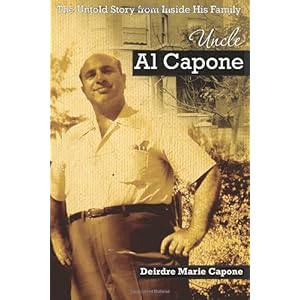Guest Blogger/Editor: Chris Manganaro
The
name Al Capone brings a variety of words to mind, but it seems
unlikely that many people would think of the word uncle. It is most
likely that no one has ever thought of Al Capone in that way because
it is not a part of his image. Not the image that history and the
media have painted anyway.
As
with most things in life, we are influenced more by what we see and
what we are told than what we actually think. Most people have
learned about Al Capone from either history classes or television and
movies or perhaps even all three. These views of Al Capone are only
one side of the story.
In
Deirdre Marie Capone’s book Uncle
Al Capone: The Untold Story from Inside his Family
we are shown a different side to Al Capone, the side of those most
familiar with him: his family and friends.
Within
her book, Deirdre explores the family history using facts that she
gathered from her family as well as from her own experiences. This
makes it feel as if it is part autobiography and part family history.
By constructing the book in such a way, she is able to naturally
incorporate the idea of family into every facet of the book. With a
larger than life character such as Al Capone gracing the cover, it is
no easy feat to cover so much ground.
Al Capone, of
course, cannot be ignored and so we are shown how his presence and
existence affected the family during and after his death. It is more
than likely that someone reading this book has some interest in
learning more about Al Capone. Deirdre does not disappoint those
types of readers, as she tries to add details about Al Capone and the
family that have never been written about before. Did you know that
Al Capone was a fan of jazz and helped give many famous jazz players
their starts?
Of course, the book
is still engaging to those readers who do not have a particular
interest in Al Capone as it is filled with many interesting stories
and insights into living in a family with a notorious name.
The book tries to
show how much of what Al Capone did was for his family. He was making
money to support his family just like anyone else. The only
difference is that he was forced to use an alternative method. To
him, The Outfit, as they called it, was a business.
We also see;
however, the negative aspects of being related to Al Capone through
not only Deirdre’s own experiences, but her families’. There were
instances of suicide and lost jobs, yet, despite everything, their
family was still warm and loving.
The incorporation of
photos and recipes in the book help to make her point about the
Capone family being just like any other family. When looking at the
photographs, one would be hard pressed not to see their own family
photos in them. According to the book, Al Capone was very family
oriented and so the photos are like evidence to back up the fact.
The recipes have the
same sort of effect. All families have their own special recipes. The
Capone’s were just like everyone else. Al Capone even enjoyed
cooking.
In the end, all
parts of the book add up to form a picture of Al Capone that has
never been seen before. Deirdre claims on more than one occasion that
her “Uncle Al was not perfect” but the point that she was trying
to make is that he was human. He wanted to help his family and keep
them safe. He suffered from nightmares. He was not the monster that
people may have seen him as, but a living, breathing person who had
his own thoughts and feelings. His own family.

No comments:
Post a Comment